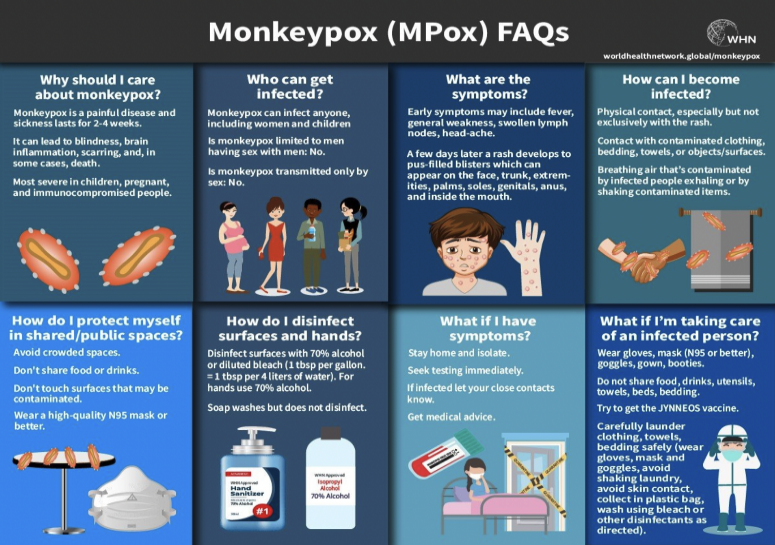Monkeypox: What You Can Do to Stay Safe
Published on September 8, 2022
The rapid rise of monkeypox cases throughout the world in a context of inadequate monitoring and prevention led to
WHN’s declaration of the monkeypox global outbreak as a Public Health Emergency, followed by the World Health
Organization, multiple US states, and the White House.
Who can get infected?
Monkeypox can infect anyone. Monkeypox is very environmentally stable, and can persist in the air and on surfaces
for days or weeks. It can be transmitted via aerosols and droplets, via contaminated surfaces and objects, close
physical contact, including sexual intercourse, and contact with the monkeypox rash.

How can I protect myself and others?
1. Know the symptoms: Early symptoms may include fever, general weakness, swollen lymph nodes, headache. A few days later a rash develops which can appear on the face, inside the mouth, trunk extremities, palms, soles, genitals, anus.
2. Avoid physical contact, especially but not exclusively with the rash on others (or even your own).
3. Avoid contact with contaminated clothing, bedding, towels or objects/surfaces.4. Wear a high-quality, high-filtration mask (N95, FFP2 or better) when in proximity with others who may be infected,
and when in public spaces.
5. Avoid crowded spaces. Don’t share food and drinks, utensils. Don’t touch surfaces that may be contaminated. Disinfect surfaces and objects that may be contaminated with 70% alcohol or a 1:200 (1 tbsp bleach / gallon water = 15ml bleach / 4 liters of water) bleach solution. (Note: Soap and water are NOT effective disinfectants against monkeypox.)
If infected or if you suspect an infection:
Stay at home and isolate. Seek testing immediately. If infected, let your close contacts know. Get medical advice.
Remain in isolation until all scabs have fallen off and new skin has formed.
JOIN US!📢 Join WHN’s Long COVID Symposium on Sept 15, 2022 for discussions that examine the
impact on patients, society, labor markets and productivity, and the future of our health.
RESOURCES
COVID-19
FDA approves new bivalent COVID-19 booster (FDA)
Removing masking requirements in schools results in higher infection rates (Preprint)
The economic impact of long COVID: millions in the US have long COVID. Many of them are not working (NPR)
Study links microbleeds in brain following COVID-19 to aging and cell damage in the brain (Ageing Research
Reviews)
Increased intracranial infections in children during the first two years of the COVID-19 pandemic (MMWR)
Morphological, cellular, and molecular basis of brain infection in COVID-19 patients (PNAS)
Monkeypox
WHN issues safety guidelines against infection with monkeypox (WHN)
Evidence for human to (pet) dog transmission of monkeypox (The Lancet)
FDA grants emergency use authorization for a different dosing regiment of the JYNNEOS vaccine. This mode of
immunization would help increase available vaccines. (FDA; Twitter)
Evidence of monkeypox virus recombination (Preprint)
Polio
New York Health Department warns that hundreds may be infected with polio. (CBS)
Polio virus detected in London (GOV.UK)
New York (Rockland Country) polio strain matches the one detected in London and Jerusalem (MSN)
New York officials urge everyone not immunized against polio to get vaccinated (CBS)